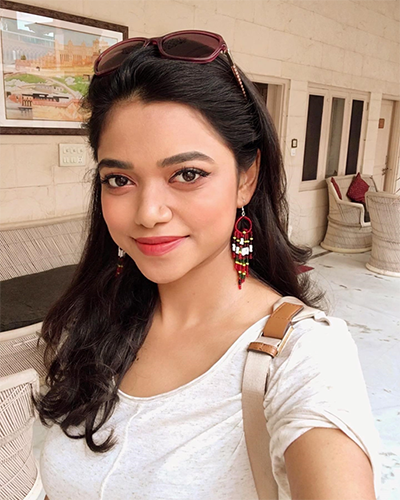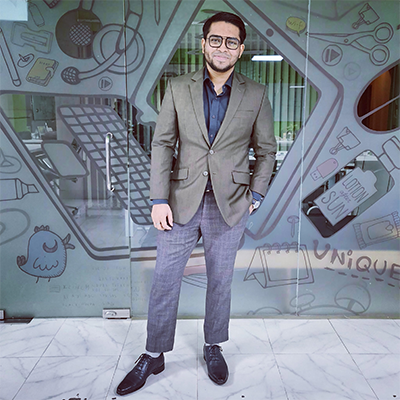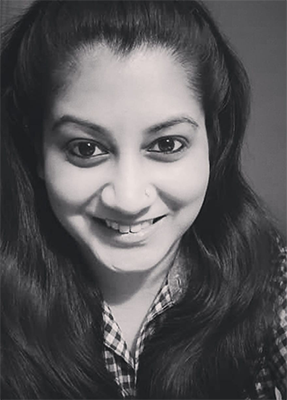In conjunction with this year’s WARC Awards for Asian Strategy, this series aims to showcase perspectives from young strategists across Asia, highlighting their take on strategy as a marketing discipline and career path. We head to Bangladesh this week.
As one of the most exciting markets in Asia, Bangladesh never ceases to surprise. One of the few economies to have managed the pandemic better than others, the country is well-positioned in the immediate future, experts say. And leading from the front will be the Bangladeshi youth.
It gets even more exciting with the WARC Awards for Asian Strategy 2021. Last year, Bangladesh entered the awards after a long absence and Grey Bangladesh took home the Grand Prix. This year, ahead of the awards, we spoke to some young strategists from the country. Watch out for these young guns.
Rebecca Nusrat Ali

Title: Group Manager, Strategic Planning
Company: Asiatic Marketing Communications Limited
Age: 29
How did you find your way into strategy work? Was it something you’ve always wanted to pursue?
I didn’t start out to be a strategic planner. In fact, when I started working in advertising, I wasn’t even sure what strategy work entailed (and there are days when I still find myself asking that question). So, my journey wasn’t exactly a typical one – I started in microcredit finance, moved to marketing, then to creative copywriting, and finally ended up in strategic planning. Et voilà, it turned out to be exactly what I was looking for – perfectly feeding my need to understand what a brand stands for, who it is meant for and finally, why it works.
As a strategist, how do you spend your time at work?
Making, reviewing and arguing about PPT decks! For real. But a more appropriate answer would be - help my creative team understand the brand, people, culture and trends. And help clients make sense of the creativity.
A good portion of my time goes into primary and secondary research to understand the product or brand I’m working on, the market landscape it is operating in, interviewing people to understand their needs and challenges, trends everyone can’t get enough of. Then finally funnel all of that into a 265-slide PPT deck that, more often than not, prompts my creative team to give me a death stare (I will take that over a blank stare any day)
After we move past the initial annoyance, I present them the key insights based on which we come up with a “big idea” that translates to each and every facet of the campaign – from the creatives, to the touchpoints, to the activities.
And finally present it to a client in a way that will make sense of the creative approach taken.
How do you define the discipline of marketing strategy?
A marketing strategy is basically an instruction manual of WHAT, WHO, WHY & HOW backed by audience and market insights, to help brands efficaciously tackle a core consumer challenge and transform the brand into an emotional experience – triggering a positive feeling in the consumer mindset.
What’s on your wishlist in terms of strategic thinking/work?
Strategic thinking takes time, reflection, time, time, and more time. Bouncing from meeting to meeting won’t always allow you to apply your best critical and creative thinking to a problem at hand. The importance of time can’t be overemphasised here. Thinking strategically is about getting into a direction without taking the usual route by applying something you just learned two hours ago!
Sadly, when it comes to strategic thinking, time is always of the essence. I wish our departments and clients would understand that if appropriate time is allocated for strategic thinking, the resulting output or the perceived “flesh” of the whole process, i.e. the creatives, would be far more innovative, effective and actually “creative”.
Where do you see yourself in 5-10 years?
While I love working with brands, in terms of my career trajectory, I see myself extensively working on projects addressing gender-based violence and period poverty – whether I do it from an ad agency or an organisation working on women empowerment.
Where do you see strategy headed in the next 10-15 years?
Living in a world that is changing exponentially – where powerful movements are ignited by a single tweet or where anyone with an innovative idea can put it into action faster than you can say “startup” – brands shouldn’t work on just becoming more adaptive and flexible but also more relevant to the world that surrounds us.
I hope brands would be more open to change and accept strategic thinking as well as creative approaches that take into account the evolving consumer mindset, and shift from product USPs to immersive experiences. Let’s be honest, consumers are far smarter than we give them credit for and should be dealt with as such.
While rigorous data analysis is key to strategic thinking, going back to the basics of understanding the human psyche and the human challenges relevant to our times, and then applying imaginative but critical thinking to solve it IS what great strategic work is all about, and should be all about, in the foreseeable future.
Azim Nowaz Khan

Title: Assistant Manager, Strategic Planning
Company: FCB Bitopi
Age: 27
How did you find your way into strategy work? Was it something you’ve always wanted to pursue?
Marketing has been my area of interest and passion from day one of my undergrad life. I spent four years there, being associated with the university’s marketing club, ending as the president, having served for two semesters. And this was the time when I realised the importance of strategic planning in marketing and brand development.
I knew I was going to pursue a career in brand management, as that is the part I am most interested in. But it was my first full-time job in an advertisement agency where I realised the true importance of having a proper strategic framework, considerations and contingencies in place before going ahead with any form of marketing communication.
From that point on, I fell in love with the art and science of strategic planning and coupled with my pre-existing passion for brand development and management, I considered this the absolute perfect line of work for me.
Having new challenges to overcome and new objectives to achieve almost every single day made this a profession unlike any other. Knowing about new industries, new brands, new cultures and new insights almost every other day is what makes this line of work so rewarding and dynamic. And this is what made the decision of choosing to be a strategic planner a no-brainer.
As a strategist, how do you spend your time at work?
Strategic planning is a department that always needs to be in sync with the account management and the creative department. It is of paramount importance to have a good working relationship with each member of the team.
Understanding what the brands truly want and then figuring out what they really need is the first course of action, and that often takes up the most amount of time. This is where the team synergy makes all the difference in the world. And once the objective of the task is set and decided by everyone in the team, the role as a strategist is to go hunting for that one insight that binds everything together. An insight that solves both the business and the human problem with the product or service being offered. And this requires getting out there and observing and learning from the group of people we are intending to convince or provide a solution to.
The recipe includes a combination of desk research and field research, as well as online surveys. After that, it is a matter of presentation, which does not mean a compilation of PowerPoint slides and reading it out in front of the clients. A presentation is a form of communication in itself and just like the brands being presented on, a presentation must tell a story about the insight being worked with. Getting that story right often determines the outcome of the strategy.
How do you define the discipline of marketing strategy?
The sole purpose of marketing strategy for me is to make things simple because that is the hardest thing to do.
I strongly believe that if you have to explain your ad or communication material to the audience, then it has failed its purpose. You do not get to present the hours of brainstorming and convoluted logics and rationales to the people you are reaching out to; you get only seconds of their attention.
And in that amount of time, if you want to get your message through, you have to be simple and intriguing at the same time. Making and keeping things simple is the most complicated process, and this is what I believe the discipline of marketing strategy is or should be dedicated towards. Keeping it simple is not that simple.
What’s on your wishlist in terms of strategic thinking/work?
Strategy is heavily reliant on research and apart from getting the help of research agencies, there is no other way or method available to conduct an actual scalable research for any project, apart from a few exceptional once-in-a-blue moon instances, or major pitches. More often than not, the clients also don’t seem willing to provide the time and resources required to carry out a thorough survey in order to find out valuable information and future-proof the brands.
Without knowing the trends of the brands, consumers and their categories to date, one cannot suggest, forecast or project their future endeavours correctly. I dream of a time when every communication agency will have a dedicated research team comprising statisticians, economists and psychologists to find out insights that are more than just some verbatims or quoted figures from an article.
And in order to ever achieve that goal, clients also must prioritise strategic planning and value its contribution in formulating the final creative outputs.
Where do you see yourself in 5-10 years?
When it comes to my career and personal growth, I have always aspired to only do things that I am truly passionate about and never compromise with work satisfaction. And I seem to have found a field that I am both passionate and comfortable working in.
Apart from that, the level of dynamism a communication agency provides, being able to work with so many different brands, and learning from them is something I surely want to make the most out of in the next 5-10 years.
After that, I plan to work on more concentrated projects, where I will be able to use my experience and expertise gathered from working with different categories on one single brand. Be that a well-established name or a relatively new startup, it will always depend on the challenges and objectives associated with the projects.
Where do you see strategy headed in the next 10-15 years?
Strategy is a discipline that’s finally being prioritised by local clients. The global brands that operate across multiple countries and cultures always understood the necessity of having a proper strategy in place. And the local brands are also increasingly following in their footsteps. Even some of the promising startups realise the importance of having strategic business partners to survive in this hyper competitive market. And with the evolution of digital media, new angles and aspects of strategic planning have been added to the practice.
All these indicate toward more young talents and potential prospects being attracted to join this field of work, as well as agencies and clients both investing more on developing the resources and modules related with building a comprehensive strategic planning department. It is only an inevitability when all of us in the world of marketing realise and accept the fact that “failing to plan, is planning to fail”.
Sumaira Tash-had

Title: Manager, Strategy, Execution & Performance Management
Company: MediaAxis/Carat
Age: 30
How did you find your way into strategy work? Was it something you’ve always wanted to pursue?
When I completed a year in my first job, I realised it had been a year and I am just stuck here doing exactly what I was doing a year ago and repeating the same kind of tasks every single day. Neither was I able to apply my marketing knowledge on the job nor was I learning anything new. That’s when I decided to switch. I started applying here and there without knowing for sure what kind of a firm I wanted to join. I just needed to leave that oh-so-monotonous job!
Then I got recruited by one of the top media agencies of the country and was sent to the digital department. While executing campaigns and making reports, I got curious about how everything comes together. That’s how I got interested in strategies and wanted to implement some on behalf of clients. I realised that in order to be very good at strategy, platform understanding is crucial. And then things became easier since I have been executing campaigns all along.
As a strategist, how do you spend your time at work?
In order to create the journey from client’s brief to end-consumers, a solid understanding and sound knowledge of multiple available platforms are key. Because you are going to need that when you are working on your media mix.
Since I have media buying and planning experience, I know quite a bit about platforms already. But the most exciting thing about digital media is that it is ever changing! So you have to keep yourself busy getting updated regularly and that is exactly what I like to do. This can be done through studying, watching videos, reading articles and also through networking and maintaining a healthy professional relationship with our external partners.
How do you define the discipline of marketing strategy?
Marketing strategy is the process for answering the following questions in order to meet the business KPI:
- What kind of mediums will be used?
- What kind of content will work best?
- How much budget to spend on each platform?
- Who is my target audience, where are they and how can I reach them in the most cost-efficient way possible?
- How will I convert my potential audience into my customers?
Where do you see yourself in 5-10 years?
I have been working in agencies for quite some time now and I am not bored yet! Although I have never worked in corporations, I somehow feel like agencies have their own charm. The diversity, the rush, the bonding, the crazy brainstorming sessions – these are only possible in agencies. I would like to stay in agencies for a few more years because there is still a lot to learn!
Where do you see strategy headed in the next 10-15 years?
Strategy is planning ahead calculatedly, considering a lot of factors at once. People are getting more used to the idea of strategists involved in designing campaigns for their brands. I personally believe this need will be stronger than what it is at the moment.
How to enter the WARC Awards for Asian Strategy
The WARC Awards for Asian Strategy are now open for entries. The deadline for submission is July 14, 2021.
Now in their 11th year, the Awards aim to showcase the region’s best strategic thinking with a view to inspire the next generation of strategists.
Entry is free. For more info on how to submit your work, visit the Awards website.

